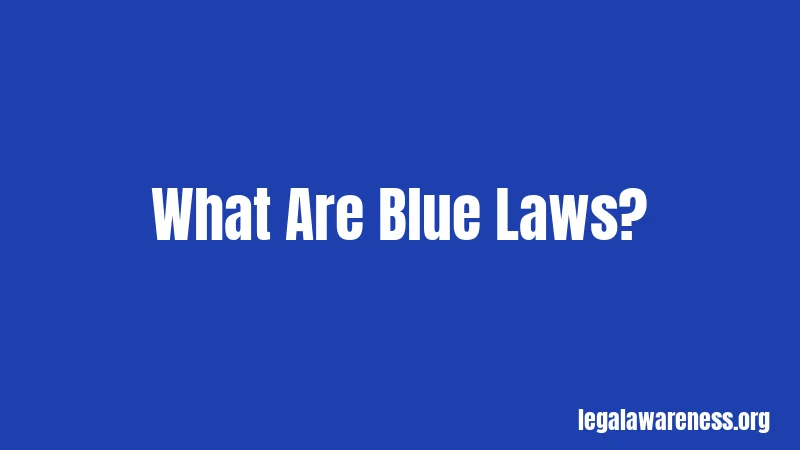Blue Laws in New Jersey (2026): Sunday Shopping Still Banned Here
Most people have no idea these laws still exist. Seriously. But in parts of New Jersey, you can’t buy a shirt or a couch on Sunday. Meanwhile, the rest of the state moved on decades ago. Let’s break down exactly what’s going on with New Jersey’s blue laws and why Bergen County is stuck in the 17th century.
Here’s the deal. New Jersey has blue laws on the books. These are old-school rules about what you can and can’t do on Sundays. They date back to colonial times when lawmakers wanted everyone in church, not shopping. Most of the state ditched these restrictions back in 1959. Bergen County? They kept them. And they’re still enforcing them today.
What Are Blue Laws?

Blue laws restrict certain business activities on Sundays. The name supposedly comes from the blue paper the original laws were written on back in the 1600s. These laws were all about promoting a day of rest and worship. Think of them as rules that tried to keep Sundays sacred.
Different states had different blue laws. Some banned alcohol sales. Others restricted shopping entirely. Many prohibited working on Sundays at all. New Jersey’s version focuses on specific types of shopping and car sales.
The laws have religious roots, for sure. But the Supreme Court ruled they’re constitutional. Why? Because they also give workers a guaranteed day off. That’s the official reason they’re still allowed to exist.
Bergen County’s Sunday Shopping Ban
Wondering if this applies to you? If you live in Bergen County, absolutely yes. If you’re anywhere else in New Jersey, not really.
Bergen County enforces NJSA 2A:171-5.8, which prohibits Sunday sales of clothing, wearing apparel, building and lumber materials, furniture, home and business furnishings, and household or business appliances. Basically, if it’s not food, gas, medicine, or entertainment, you probably can’t buy it on Sunday in Bergen County.
Here’s what you CAN buy on Sundays:
- Groceries and prepared food
- Gas
- Medication and drugs
- Alcohol (at bars and restaurants)
- Newspapers
- Milk products
- Agricultural products (no hardware though)
Here’s what you CANNOT buy on Sundays:
- Clothing and shoes
- Furniture
- Appliances
- Electronics (with some exceptions)
- Building supplies
- Cars (this one’s statewide, more on that later)
Video game stores get a pass somehow. They can open on Sundays. Don’t ask me why.
Paramus Takes It Even Further

Paramus has the strictest blue laws in Bergen County. Pretty much all work is banned on Sundays. The only exceptions are grocery stores, gas stations, pharmacies, hotels, restaurants, and entertainment venues.
Three of Bergen County’s five major malls are located in Paramus. On Sundays, they’re ghost towns. The parking lots are empty. The stores are dark. It’s actually kind of eerie if you’re used to Sunday shopping anywhere else.
Hold on, this part is important. Paramus officials take these laws seriously. They’ve sued to enforce them. They’re not messing around.
The American Dream Mall Controversy
Okay, this one’s interesting. American Dream is this massive mall in East Rutherford. It opened in 2019. And in 2024, they started letting retail stores open on Sundays. Bergen County officials believe this violates the blue laws.
The mall argues they’re exempt. Why? Because they sit on state-owned land managed by the New Jersey Sports and Exposition Authority. They claim the blue laws don’t apply to state property. A lawsuit was filed in Bergen County Superior Court in August 2025.
Here’s where it gets messy. The mall says they’re no different than MetLife Stadium, which also sells merchandise on Sundays. County officials say that’s ridiculous and gives American Dream an unfair advantage over other Bergen County businesses that follow the rules.
The Attorney General’s office got involved. As of late 2025, this was still being hashed out in court. Stay tuned.
New Jersey’s Statewide Car Sale Ban

Not sure what counts as a violation? Let me break it down. Across ALL of New Jersey, you cannot buy or sell a car on Sunday. Period. This isn’t just Bergen County. This is the entire state.
The last year you could legally purchase a car at a dealership on a Sunday in New Jersey was 1936. That’s right. Almost 90 years ago.
Under N.J.S.A. 2C:33-26, engaging in the business of buying, selling, or exchanging motor vehicles on Sunday is illegal. This means every single car dealership in New Jersey is closed on Sundays. No test drives. No sales. Nothing.
Why do dealerships support this? Honestly, most of them love it. They save on operating costs. Electricity, staffing, all that stuff adds up. Plus, their employees get a guaranteed day off with their families.
Lawmakers have tried to overturn this ban. The dealerships fought back. They want to keep it. So it stays.
Penalties and Consequences
Sound complicated? It’s actually not. The penalties vary depending on what you violate.
For selling prohibited items on Sundays in Bergen County:
- First offense: $250 fine
- Second offense: $250 to $1,000 fine
- Third offense: $1,000 to $2,000 fine, or up to 30 days in jail, or both
- Fourth offense and beyond: $2,000 to $5,000 fine, or 30 days to 6 months in jail, or both
Each single sale to one customer counts as a separate violation. So if you sell three shirts to three different people, that’s three violations. The fines add up fast.
For selling cars on Sunday anywhere in New Jersey:
- First offense: $100 fine or up to 10 days in jail, or both
- Repeat offenses get worse
- Dealerships can lose their license to operate
That last one is the real threat. No dealership wants to risk losing their license over Sunday sales.
Why Bergen County Keeps These Laws
Most people don’t realize how strict these laws are. Voters in Bergen County have had chances to ditch the blue laws. They rejected efforts to end the Sunday shopping ban in 1980 and again in 1993.
Why? Two main reasons keep coming up.
First, traffic. Bergen County has one of the largest concentrations of enclosed retail shopping malls of any county in the nation. Sunday traffic is already bad in North Jersey. Imagine if all those malls opened on Sundays. The roads would be a nightmare.
Second, quality of life. Many residents like having one day when things are quiet. When they don’t have to deal with shopping crowds. When retail workers get a break.
County Executive James Tedesco has been a strong supporter. He argues the laws enhance residents’ quality of life and guarantee retail employees at least one day off each week.
The Rest of New Jersey Moved On
Here’s the thing. Bergen County is the ONLY county in New Jersey that still enforces retail blue laws. The other 20 counties? They opted out back in 1959. They said no thanks to Sunday shopping bans.
So if you live in Middlesex County or Monmouth County or anywhere else, you can buy whatever you want on Sunday. Clothes, furniture, appliances, all good. Just not cars.
This makes Bergen County kind of unique. It’s literally one of the last places in the entire United States with these kinds of restrictions.
Historical Context
Blue laws have been around forever in New Jersey. The earliest form appeared in 1677 when the General Assembly of East Jersey banned “singing of vain songs or tunes” on Sunday. Yep, you couldn’t even sing the wrong songs.
In 1798, New Jersey passed an “Act to Suppress Vice and Immorality.” These laws were hardcore. You couldn’t travel more than 20 miles on Sunday unless you were going to church or seeing a doctor. Fines for disobeying ranged from $1 to $14. Swearing cost you 50 cents.
Authorities could seize anything being sold on Sundays. They’d auction it off. The money went to support the poor.
Times have changed, obviously. Most of these old restrictions are gone. But the shopping bans in Bergen County remain.
What This Means for Shoppers
Confused about the difference? Let me break it down. If you’re planning a shopping trip to Bergen County, avoid Sundays. You’ll just be disappointed. The malls are closed. The big-box stores are closed. Most retail is shut down.
Grocery stores, restaurants, and gas stations will be open. You can grab dinner or fill up your tank. But don’t plan on buying new clothes or furniture.
If you live in Bergen County and need to shop on Sunday, you have options. Drive to another county. Seriously. Head to Passaic County or Essex County. Their stores will be open.
Or shop online. The internet doesn’t have blue laws. Order what you need and have it delivered Monday.
Dry Towns vs. Blue Laws
You’re not alone, this confuses a lot of people. Blue laws are different from dry town laws. Let me explain.
Blue laws restrict Sunday shopping or specific Sunday activities. Dry towns ban alcohol sales completely, every day of the week. At least 30 New Jersey municipalities out of 565 prohibit retail alcohol sales altogether.
Most dry towns are in South Jersey. They started as Quaker, Methodist, or other Protestant religious communities. Examples include Ocean City, Ocean Grove, Far Hills, and Wildwood Crest.
You can still possess or drink alcohol in dry towns. You just can’t buy it there. It’s a different restriction entirely from blue laws.
The Hurricane Sandy Exception
In November 2012, Hurricane Sandy hit New Jersey hard. Many homes lost power. People needed supplies. Governor Chris Christie issued an executive order to temporarily suspend the blue law. Stores could open on Sunday, November 11.
The Borough of Paramus challenged it legally. They lost. The suspension happened. But the blue law came back into effect on November 18.
This shows the laws can be suspended in emergencies. But officials take them seriously the rest of the time.
Arguments For and Against
People have strong opinions on both sides. Here’s what supporters say:
Supporters argue the laws reduce traffic congestion. They give workers a guaranteed day off. They preserve Sunday as a day of rest. They support local quality of life.
Opponents say the laws are outdated and ridiculous. They’re based on religion and shouldn’t exist in modern America. They hurt businesses and inconvenience consumers. They’re archaic and unnecessary.
The debate continues. Don’t worry, we’ll break it down step by step. Both sides make valid points. But for now, the laws remain.
How to Comply
Honestly, this is the part most people miss. If you own a retail business in Bergen County, you need to follow these laws. It’s not optional.
Check the specific list of prohibited items. Make sure you understand what you can and can’t sell on Sundays. When in doubt, close on Sundays or only sell permitted items like food and medicine.
If you’re unsure, contact the Bergen County offices. Get clarification. It’s better to ask than face fines.
And if you’re caught violating the law? Those fines stack up fast, remember. Each sale is a separate violation.
The Future of Blue Laws
Will these laws change? Maybe. Lawmakers have proposed repealing them before. But Bergen County residents keep voting to keep them. And dealerships across the state support the car sale ban.
For now, these laws aren’t going anywhere. If you want them changed, you’d need to vote in local elections. Contact your county representatives. Make your voice heard.
But based on history? Don’t hold your breath. These laws have survived for decades. They’ll probably stick around a while longer.
Frequently Asked Questions
Can I buy groceries on Sunday in Bergen County? Yes. Grocery stores are exempt from blue laws. You can shop for food, prepared meals, and beverages on Sundays without any problem.
What happens if I accidentally buy prohibited items on Sunday in Bergen County? As a customer, you won’t face penalties. The business selling the items gets fined. But the sale itself may not be valid, and stores typically won’t risk it.
Why are car dealerships closed on Sunday everywhere in New Jersey? It’s state law. N.J.S.A. 2C:33-26 makes it illegal to engage in car sales on Sundays. The law has been in place since 1936 and dealerships actually support keeping it.
Can I buy a car from a private seller on Sunday? Technically no. The law prohibits “engaging in the business” of buying, selling, or exchanging motor vehicles on Sunday. This could include private sales, though enforcement focuses on dealerships.
Are online orders affected by blue laws? No. You can place online orders any day of the week. The restrictions only apply to in-person retail sales in physical stores on Sundays in Bergen County.
Final Thoughts
Now you know the basics. New Jersey’s blue laws are weird, outdated, and mostly limited to Bergen County. The car sale ban affects the whole state. But for retail shopping restrictions, it’s really just Bergen County holding on.
These laws have deep roots. They’ve survived multiple repeal attempts. Residents keep voting to maintain them. So for now, Sunday shopping in Bergen County means groceries and gas, not clothes and couches.
If you need to shop on Sunday, head to another county. Or order online. It’s 2026, after all. You’ve got options.
References
- New Jersey Statutes Annotated 2A:171-5.8 – Sunday Closing Law (https://law.justia.com/codes/new-jersey/title-40a/section-40a-64-1/)
- Township of Wyckoff Official Website – Sunday Shopping Prohibition (https://www.wyckoffnj.gov/municipal-clerk/faq/why-sunday-shopping-prohibited-wyckoff-and-throughout-bergen-county)
- Bergen County Official Information – Sunday Closing Law (https://bergenfieldnj.gov/bergen-county-blue-laws/)
- NJ.com – American Dream Mall Blue Laws Controversy (https://njbiz.com/bergen-county-american-dream-breaking-blue-laws/)
- New Jersey Penal Code 2C:33-26 – Motor Vehicle Sales Prohibition (https://law.justia.com/codes/new-jersey/title-40a/section-40a-64-1/)
